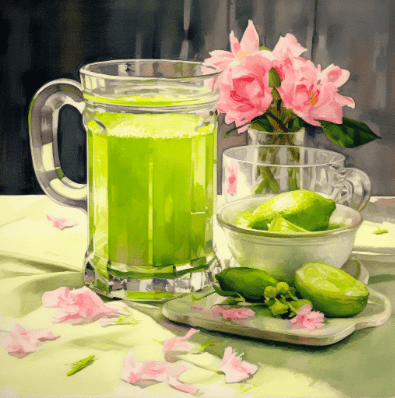
Don’t want to read the whole post?
Sencha vs matcha? The choice ultimately depends on your personal preferences, desires, and goals. If you crave a refreshing and vibrant flavour, and to steep your tea then choose sencha. Or, if you want a unique taste and creamier texture then choose matcha.
ABOUT ME
Be beauty. Be plant-based!
As a former Registered Nurse and avid plant-muncher, I’m in love with how simple plant-based foods make it so easy to be beautiful.

You might also like:
Matcha Magic: The Power of Green Tea for Acne-Free Skin
Sitting in front of her laptop, Poppy is immersed in a decision: Which type of tea is best for her and how can she decide? Sencha vs, matcha?
Reading the descriptions of Sencha green tea, they paint a picture of a refreshing and grassy flavor with hints of sweetness. Poppy imagines the crisp, clean taste of Sencha accompanied by a delicate aroma. It leaves her palate feeling refreshed.

Sencha seems like the perfect companion for her mornings or a rejuvenating pick-me-up in the afternoon.
Skip to: Exploring the Delights of Sencha
On the other hand, Matcha is a powdered tea which beckons Poppy with a bright green colour and unique Japanese tradition. She can’t help but imagine an elegant Japanese tea ceremony of whisking hot water into the fine green powder with a chasen bamboo whisk, creating a frothy, velvety green tea.
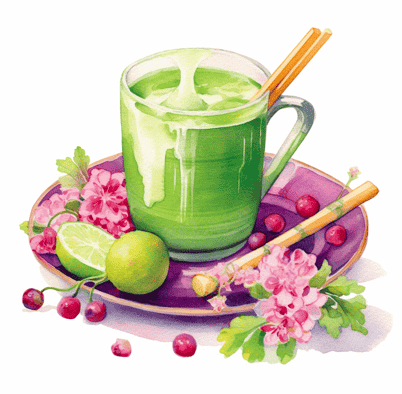
Matcha has a rich umami flavor, accompanied by a hint of sweetness and a subtle vegetal undertone. It would be a truly unique experience. It’s also versatile: one can also indulge in a cool cup of Matcha latte or enjoy a Matcha-infused dessert.
As Poppy browses through the vibrant product images and reads the enticing descriptions, she can’t help but feel torn between the two.
Skip to: Exploring the Delights of Matcha
However, taste isn’t the only factor Poppy considers. The overall impact on her mind and body is important too.
Sencha, known for its abundance of antioxidants, could be her ally in supporting overall well-being and maintaining a healthy immune system. Matcha, celebrated for its concentrated nutrients and higher antioxidant content, holds the promise of boosting her energy and promoting a sense of calm as well.
As Poppy continues to think, she realises that it’s not just about taste and health benefits; it’s also about the experience. Sencha, with its simplicity and traditional brewing methods, offers a connection to the rich history of Japanese tea culture. On the other hand, Matcha’s ceremonial preparation invites her to slow down, be present, and savour each moment.
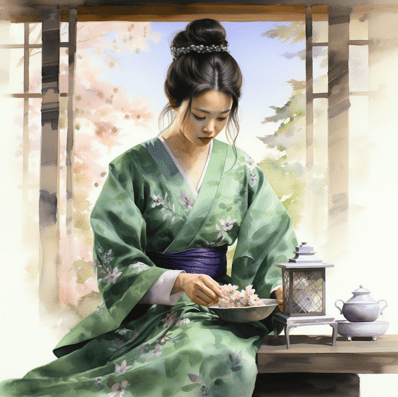
Several minutes have passed. Poppy has to make the decision. With the pressure to move on, she suddenly realises that the choice ultimately rests on her personal preferences, desires, and goals. Weighing the taste profiles, potential health benefits, and experiences each tea offers. Perhaps she craves the refreshing and vibrant flavours of Sencha or the unique and immersive experience of Matcha.
You might also like: Ceremonial vs Culinary Matcha: Which is Right for You?
With a newfound clarity, Poppy makes her choice, adding both a Sencha and a Matcha to her shopping cart. A sense of excitement fills her heart, knowing that this indulgence will result in a delightful tea journey that will also benefit her mind and body.
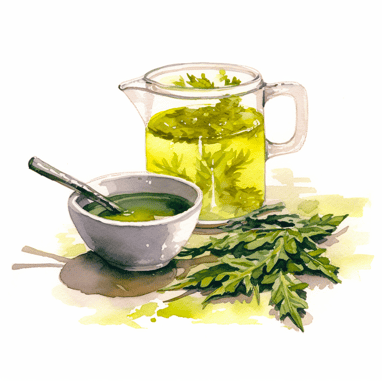
Anticipating her first sip of both the Sencha and Matcha, Poppy waits eagerly for their arrival.
When it comes to Japanese green teas, Sencha and Matcha are some of the most popular green teas. Yet they are also two very different types of tea that offer unique flavours and characteristics for green tea lovers. Both teas come from the same Camellia sinensis plant making it difficult to understand the benefits of Sencha vs Matcha at first glance. The main difference is that they undergo different processing methods, which results in two sets of distinctive qualities.
Discover which green tea will suit your taste buds and preferences below.
Exploring the Delights of Sencha
Sencha tea is a traditional Japanese green tea known for its delicate flavours and vibrant green colour. is typically grown under direct sunlight. Sunlight exposure stimulates the tea plants to produce a greater amount of chlorophyll, which gives Sencha its vibrant green colour. It is commonly available in loose leaf for or tea bag form, although you can also purchase Sencha powder.
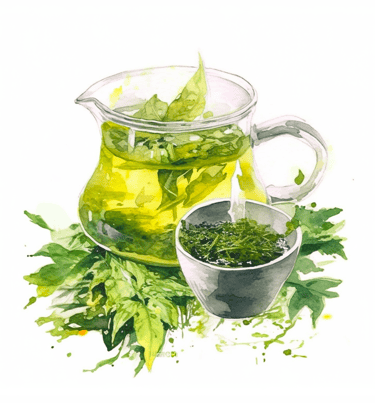
Sencha is made from young tea leaves that are steamed, rolled, and dried to preserve their natural freshness. The leaves are then brewed in hot water, extracting the essence to deliver a refreshing and grassy aroma and taste. This unique process leads to several great qualities about Sencha:
Distinctive Taste
One of the great aspects of Sencha is its rich and unique taste. It offers a balanced combination of grassy, vegetal notes with a hint of sweetness, resulting in a delightful and invigorating tea experience. The flavour profile of Sencha can vary depending on the region and processing techniques, offering a diverse range of options to suit different preferences.
Abundance of Antioxidants
Another lovely quality of Sencha is its abundance of beneficial compounds. It is rich in antioxidants, such as catechins, which contribute to its potential health benefits. These antioxidants help protect the body against free radicals and oxidative stress, supporting overall well-being.
Calming Moments
Sencha also contains amino acids, including L-theanine, which promote relaxation and a calm state of mind. This unique combination of caffeine and L-theanine provides a gentle energy boost without the jitters often associated with other caffeinated beverages.
Furthermore, Sencha offers convenience in its preparation. Unlike Matcha, which requires whisking of a fine powder to form the tea, Sencha is typically brewed by steeping loose tea leaves in hot water or using a teabag. This simplicity makes Sencha accessible and easy to enjoy.
Learn how to brew sencha here.
Exploring the Delights of Matcha
Matcha, on the other hand, is a powdered form of the Japanese teas offering a distinct and immersive tea experience. It is renowned for its ceremonial preparation and unique flavour profile.
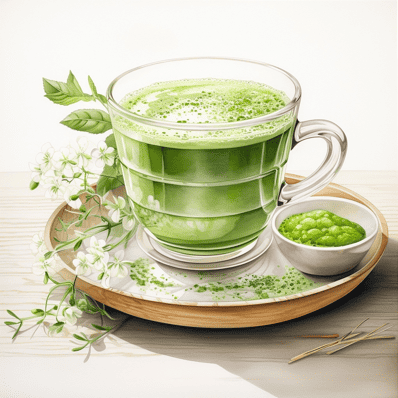
The journey of Matcha begins with the shading process, where green tea plants are covered to enhance the leaves’ chlorophyll content and create a rich green colour. After harvesting, the leaves are carefully steamed, dried, and ground into a finely ground powder using traditional stone mills. This unique process leads to several great qualities about Matcha:
Umami Flavour
The flavour of Matcha is often described as rich, creamy, and with a pleasant umami taste. It carries a subtle sweetness and a hint of vegetal notes, creating a harmonious and complex flavour profile. This unique taste is a result of the high concentration of amino acids, especially L-theanine, which contributes to Matcha’s calming and focusing properties.
Concentrated nutrition
Matcha is made by grinding whole tea leaves into a fine powder, allowing you to consume the entire leaf. This means you’re getting a concentrated dose of antioxidants, vitamins, minerals, and beneficial plant compounds that are typically lost in other tea preparations.
Calm Alertness
The combination of a high concentration of the amino acid L-theanine (which creates a calm and focused mental state) and caffeine in Matcha has been shown to improve cognitive function, including attention, memory, and reaction time. This makes Matcha an excellent choice for those seeking mental clarity and improved productivity during a sustained energy boost.
Elegance
Preparing Matcha is an art in itself. Traditionally, a bamboo whisk called a chasen is used to whisk the Matcha powder with hot water in a ceremonial bowl called a chawan. The gentle whisking creates a frothy and velvety texture, elevating the tea-drinking experience.
You might also like: Matcha Magic: The Power of Green Tea for Acne-Free Skin
Sencha vs matcha: Comparing Flavor and Aroma
The flavour profile of sencha vs matcha is quite different. Sencha tea offers a mild and slightly astringent taste with subtle grassy and vegetal notes. It has a refreshing and crisp flavour that is reminiscent of spring. In contrast, Matcha has a rich umami flavour which is the big difference between it and Matcha. It also has hints of sweetness and a creamy texture from the use of whole leaves to make the tea. It also has a slightly pungent aftertaste. Its aroma is vibrant and earthy, providing a sensory experience that is distinct from other green teas.
Comparing Caffeine Content
Sencha generally contains less caffeine than Matcha. This is because Matcha is made from the whole tea leaf, allowing for a more concentrated presence of caffeine. However, the exact caffeine levels can vary based on factors such as the tea quality and preparation method. Sencha, being brewed from the leaves, generally has a more moderate caffeine content.
Comparing Health Benefits
When comparing sencha vs matcha, remember numerous health benefits due to their high antioxidant content and amino acids. They are known for their potential to boost metabolism, support immune function, and improve focus and concentration. Additionally, the amino acid L-Theanine found in Matcha provides a calming effect, promoting relaxation and mental clarity.
Sencha and Matcha are two wonderful types of green tea that cater to different preferences and occasions in your life. Sencha offers a refreshing and mild taste, making it a great option for daily consumption. Matcha, on the other hand, provides a unique and vibrant experience, making it a perfect tea for special occasions and for those seeking a more concentrated dose of antioxidants. Whichever tea you choose, incorporating Japanese green teas is great for your health, skin and youth, whilst also simply being a relaxing cup of tea.